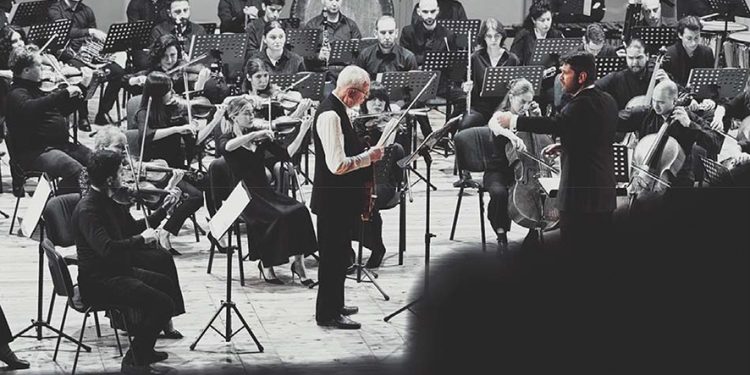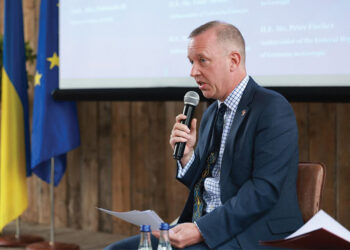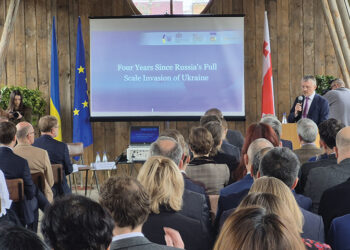The concert featuring renowned violinist Gidon Kremer alongside the Giya Kancheli Tbilisi Youth Orchestra was a convergence of masterful artistry, historic repertoire, and a reverent tribute to Georgian composer Giya Kancheli. Led by conductor Mirian Khukhunaishvili, the program unfolded as a narrative exploring musical endurance, human introspection, and the haunting beauty of shared silence, each piece reflecting unique facets of the performers and composers alike.
The Maestro on Strings: Gidon Kremer’s Artistic Legacy and Distinctive Style
Gidon Kremer is no ordinary violinist; he is, in many ways, a living legend. His career spans over five decades, characterized by an unwavering commitment to artistic integrity and a boldness in exploring lesser-known works and composers. Kremer’s repertoire is as distinctive as his style, encompassing not only the canonical masterpieces, but also a rich tapestry of 20th- and 21st-century compositions, particularly those by Eastern European composers like Mieczysław Weinberg and Giya Kancheli. For Kremer, music is an act of cultural preservation as well as personal expression, often taking him to emotionally intense territories that few performers dare to explore with such raw honesty.
Kremer’s playing style is instantly recognizable, defined by a distinct sensitivity to phrasing, a meticulous attention to detail, and an openness to vulnerability. He is known for his restrained, almost introspective sound, which he weaves into his interpretations to create a sense of intimacy between himself, the orchestra, and the audience. His sound can be strikingly delicate, yet it always carries an underlying intensity that speaks to his rigorous understanding of both technical prowess and emotional expression. Critics have often described Kremer as a “painter with sound,” using his bow to etch out musical landscapes that are as hauntingly beautiful as they are intellectually challenging.
What sets Kremer apart is not just his technical mastery, but his approach to musical collaboration. Kremer views the orchestra as an equal partner, rather than a mere accompaniment to his solo line, and this ethos was palpable in his performance with the Giya Kancheli Tbilisi Youth Orchestra. Rather than dominating, Kremer’s playing sought a conversational dynamic, allowing the orchestra space to express its own voice, especially in the interplay with second soloist Madara Petersone in Kancheli’s Twilight. This humility and mutual respect, rare in a soloist of his stature, brought a unique dimension to the performance, making the music resonate on a deeper level with the audience.
The Giya Kancheli Tbilisi Youth Orchestra: A Rising Star in Georgian Music
Despite its title as a “youth” orchestra, the Giya Kancheli Tbilisi Youth Orchestra has firmly established itself as one of Georgia’s most distinguished and respected ensembles. Founded to nurture the next generation of Georgian musicians, the orchestra has quickly risen to prominence, often outshining larger, more established orchestras in the country. Under the baton of conductor Mirian Khukhunaishvili, the ensemble has become a hallmark of precision, taste, and musical sensitivity that rivals any seasoned symphonic orchestra in the region.
Khukhunaishvili’s influence on the orchestra cannot be overstated. As a conductor, he brings a combination of rigorous discipline, a refined ear for balance, and an exceptional ability to coax both energy and restraint from his young musicians. This commitment to excellence has fostered an ensemble sound that is not only unified, but also rich in emotional complexity, allowing the orchestra to navigate the most challenging repertoire with grace. For many, the Giya Kancheli Tbilisi Youth Orchestra has become synonymous with quality and artistic dedication, a guarantee of musicality that even the largest Georgian orchestras sometimes struggle to deliver.
The orchestra’s performance during this concert was a testament to Khukhunaishvili’s painstaking efforts to shape an ensemble that operates with both technical precision and an intuitive sense of musicality. Particularly in Weinberg’s Violin Concerto, the orchestra showcased its capacity for subtlety, supporting Kremer’s meditative solo line with a restrained yet emotionally charged accompaniment. The brass and strings melded seamlessly, maintaining a balanced yet dynamic soundscape that allowed Weinberg’s introspective themes to unfold with clarity and emotional weight.
Mirian Khukhunaishvili: A Conductor Shaping the Future of Georgian Music
As the artistic force behind the Giya Kancheli Tbilisi Youth Orchestra, Mirian Khukhunaishvili has emerged as a leading figure in Georgian music. Known for his precise yet passionate approach, Khukhunaishvili has shaped the orchestra into an ensemble that is highly responsive and sensitive to both soloist and score. His conducting style is both assertive and adaptive, allowing him to handle complex, nuanced compositions, while encouraging his musicians to engage with the music on a deeply personal level.
Khukhunaishvili’s ability to bring out the best in his musicians was evident in every piece on the program. During Schubert’s Polonaise, he deftly guided the orchestra through the piece’s light-hearted phrases, creating an infectious sense of joy that resonated with the audience. His interpretation of Kancheli’s Twilight was equally compelling; he allowed silence to become part of the performance, shaping the space between notes to evoke the piece’s reflective tone. In Kancheli’s world of subtle dynamics and extended pauses, Khukhunaishvili demonstrated a profound understanding of how to allow silence to speak just as powerfully as sound.
A Concert for the Ages: Bringing New Depth to Weinberg, Schubert, and Kancheli
This concert will be remembered as a landmark event, bringing together Gidon Kremer’s storied career and interpretive genius with the Giya Kancheli Tbilisi Youth Orchestra’s rising talent. It was an evening that celebrated not only music, but also the shared cultural and historical ties that bind Georgia to the world of Eastern European and Soviet-era composers. The program was expertly curated to showcase a range of emotional tones, from the solemn resilience of Weinberg to Schubert’s lightness and Kancheli’s introspective poetry.
Through Kremer’s masterful interpretations and Khukhunaishvili’s inspired leadership, each piece was not merely performed, but fully realized; revealing new depths and layers of meaning. For the Tbilisi audience, this concert was more than a recital; it was an affirmation of Georgia’s place in the broader landscape of classical music, and a reminder of the transformative power that music holds, even in the hands of the youngest performers.
In the wake of this concert, it’s clear that the Giya Kancheli Tbilisi Youth Orchestra is setting a new standard for orchestral performance in Georgia. With a conductor of Khukhunaishvili’s caliber at the helm, and the endorsement of artists like Gidon Kremer, this ensemble is poised not only to shape the future of Georgian music, but to become a vital cultural ambassador on the world stage. For those who were present, the evening was a rare convergence of legendary talent and youthful promise—a moment in Georgian music that will undoubtedly inspire the next generation of musicians and audiences alike.
By Ivan Nechaev














